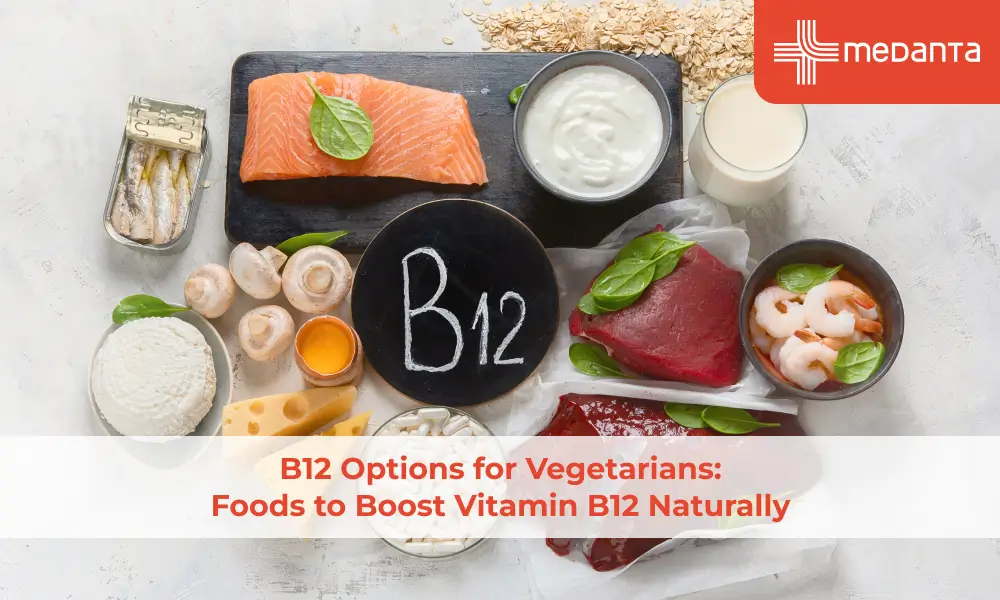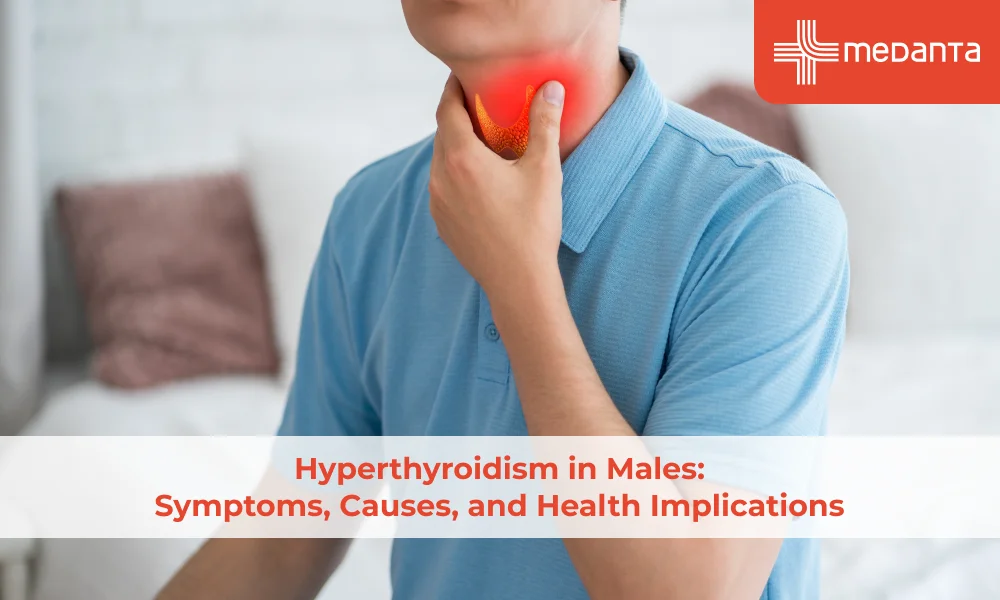B12 Options for Vegetarians: Foods to Boost Vitamin B12 Naturally

TABLE OF CONTENTS
- Why Vegetarians Are at Risk of B12 Deficiency
- Top Vegetarian Sources of Vitamin B12
- Fortified Foods to Boost B12 Intake
- Supplements and Alternative B12 Options for Vegetarians
- Tips to Maximise B12 Absorption from a Vegetarian Diet
- Benefits of Adequate Vitamin B12
- Precautions and Recommended B12 Intake
- Signs of Vitamin B12 Deficiency
- Conclusion
- FAQs
Getting enough vitamin B12 is a real challenge for vegetarians who want to stay healthy. This vital nutrient does several important things in your body, but plant-based diets don't provide many natural sources. Studies indicate that many elderly vegetarians and
A significant number of pregnant women following a vegetarian diet lack sufficient vitamin B12 pointing to a major nutritional shortfall.
This article covers the best B12 sources for vegetarians, ranging from fortified cereals to special options in Indian cuisine. You'll learn to spot deficiency symptoms and ways to boost absorption.
Why Vegetarians Are at Risk of B12 Deficiency
Plant-based diets lack enough vitamin B12 since this nutrient comes mainly from animal products. Research shows vegetarians develop B12 deficiency whatever their age, location, or demographic characteristics.
Your body needs about 2.4 micrograms of vitamin B12 daily and you need careful planning to meet this target without eating animal products. The good news is that vegetarians can choose from several B12-rich foods especially fortified products that your body can easily absorb. B12 is a vital part of your brain function and helps with many chemical reactions in your body, so knowing these sources matters a lot if you follow a plant-based diet.
Top Vegetarian Sources of Vitamin B12
Dairy products - A simple way to get B12, with one cup of milk you will get more than 50 % of the daily value
Eggs - One large hard boiled egg contains 0.5 mcg
Seaweed - They can boost your B12 levels
Mushrooms - Some types of mushrooms contain a small amount of vitamin B12
Fortified Foods to Boost B12 Intake
Fortified foods are a great way to get better B12 absorption by your body. Your options include:
Breakfast cereals with added B12 (check packaging)
Nutritional yeast - just ¼ cup of fully-fortified nutritional yeast gives you sufficient vitamin B12
Plant-based milks (though many lack B12 fortification)
Supplements and Alternative B12 Options for Vegetarians
Option | Recommended Dosage | Notes |
Cyanocobalamin tablets | 250 mcg daily or 500-1000 mcg several times weekly | Most economical and common |
B12-fortified nutritional yeast | 2 tablespoons daily (2.4 mcg) | Adds cheesy flavour to foods |
Standard multivitamin | 6 mcg | Covers average daily needs |
Vegetarians need to understand how vitamin B12 works in their bodies to make smarter food choices. The human body needs 2.4 micrograms of B12 daily. Since our bodies cannot produce this nutrient we must get it from external sources.
Vegetarians should know that consuming B12 rich foods alone is not enough because proper absorption matters too. Absorption of this vital vitamin in your body depends on several factors.
Tips to Maximise B12 Absorption from a Vegetarian Diet

Yoghurt, curd and fermented foods like idlis and dosas create healthy gut bacteria which help boost B12 absorption.
Daily sunlight exposure of 15-20 minutes improves gut health and helps your body use B12 better.
Watch your coffee habits! Caffeine disrupts vitamin B12 absorption, so keep tea or coffee away from mealtimes.
Your body will use B12 more effectively when you add spinach, lentils, and beetroot to your diet because they improve red blood cell production.
Cooking methods affect nutrient retention. B12 breaks down in dairy products and mushrooms when overcooked – steam or lightly sauté them instead.
People with certain gastric problems often experience food-bound vitamin B12 malabsorption especially those with atrophic gastritis and low stomach acid secretion. Long-term vegetarian diets can deplete B12 storage levels, putting older vegetarians at higher risk.
A high-fibre diet rich in fruits, vegetables, and whole grains supports digestive health and will give better B12 absorption overall.
Benefits of Adequate Vitamin B12
B12 for vegetarians gives great health benefits.
This nutrient helps form red blood cells, supports nerve cell function & helps synthesise DNA.
Maintaining good B12 levels prevents megaloblastic anaemia that causes fatigue and weakness.
Your brain health also benefits from adequate B12 intake, which may reduce cognitive decline and enhance memory.
B12 levels are a vital concern during pregnancy. Low levels early in pregnancy can increase neural tube defects and lead to low birth weight. Pregnant vegetarians need extra alertness since studies show many have a B12 deficiency.
B12 helps maintain bone mineral density and could lower the risk of osteoporosis over time.
Precautions and Recommended B12 Intake
Daily B12 intake recommendations for different ages are:
Birth to 6 months - 0.4 mcg
Infants 7–12 months - 0.5 mcg
Children 1–3 years - 0.9 mcg
Children 4–8 years - 1.2 mcg
Children 9–13 years - 1.8 mcg
Teens 14–18 years - 2.4 mcg
Adults - 2.4 mcg
Pregnant women - 2.6 mcg
Breastfeeding women - 2.8 mcg
Experts recommend GMP-certified B12 supplements and fortified foods for vegetarians. Check with doctors before taking supplements especially if you use medications like metformin or proton pump inhibitors.
Signs of Vitamin B12 Deficiency
Early detection of B12 deficiency symptoms helps vegetarians prevent serious health issues. Warning signs develop slowly and get worse as time passes.
Your body shows physical symptoms first:
Unusual fatigue or weakness
Pale or yellowing skin
Sore mouth or tongue ulcers
Heart palpitations with shortness of breath
Appetite loss and weight reduction
Digestive problems including nausea or diarrhoea
The body later develops neurological complications:
Tingling sensations in hands and feet
Difficulty walking or maintaining balance
Vision disturbances
Problems with coordination
Mental health often changes too:
Memory difficulties and confusion
Depression or irritability
Mood swings
The symptoms can show up just two years after you stop getting enough B12. Some neurological damage becomes permanent without proper treatment.
Babies who mothers are vegetarians and lack B12 face higher risks of developmental delays.
Many vegetarians show no symptoms despite low B12 levels (subclinical deficiency). Blood tests help catch problems before permanent damage happens.
Conclusion
Vegetarians need to keep their vitamin B12 levels in check with the help of foods including but not limited to dairy products, eggs, fortified foods & nutritional yeast. Your body needs the right conditions to absorb these sources so lifestyle choices matter too. Skipping caffeine after meals, optimal sun exposure & eating fermented foods can boost absorption of this vital nutrient in your body.
Maintaining adequate levels of B12 takes some planning but you will get immeasurable rewards like better brain functions, improved energy levels and a healthy body. Smart food choices combined with supplements create a solid foundation for vegetarian nutrition. Your body needs this attention since B12 is vital for many functions that keep you healthy every day.
FAQs
What are the best vegetarian sources of vitamin B12?
Dairy products like milk and Swiss cheese, eggs and seaweed are reliable B12 sources. A tablespoon of fortified nutritional yeast packs 4.8 mcg, making it an excellent addition to your cooking.
How can vegetarians improve their vitamin B12 levels naturally?
Add dairy products to your daily meals. Include eggs if they fit your diet. Use seaweed in soups or as snacks. Your food should be cooked at lower temperatures since high heat destroys B12.
Are fortified foods necessary for vegetarians to get enough B12?
Yes. Fortified cereals, plant milks, and nutritional yeast are crucial, especially when you have a strict vegetarian diet. Plant foods without fortification don't give you enough B12.
Can vitamin B12 supplements be taken safely by vegetarians?
Yes! Scientists haven't found any toxic effects, so there's no upper limit for B12 intake. Cyanocobalamin works best because it's stable and well-researched.
How much vitamin B12 is required daily for adults?
The recommended amount of vitamin B12 is:
Adult - 2.4 mcg
Pregnant women - 2.6 mcg
Breastfeeding women - 2.8 mcg
What are the symptoms of B12 deficiency?
Common symptoms are:
Fatigue
Pale skin
Breathing problems
Digestive issues
Later, you could develop tingling in your hands and feet, memory issues, and mood swings.
Can vegetarians rely solely on plant-based sources for B12?
No. Microorganisms produce B12, not plants. Without fortified foods or supplements, vegetarians—especially vegans—will develop B12 deficiencies over time.






